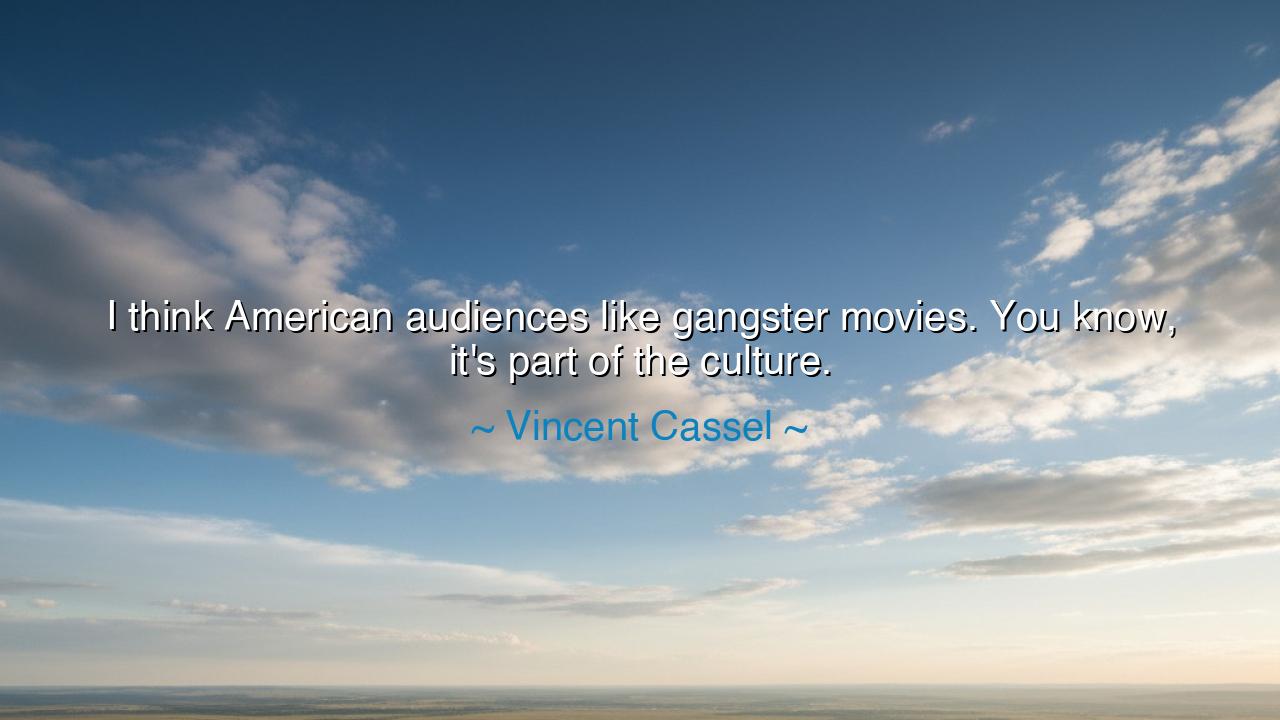
I think American audiences like gangster movies. You know, it's






Hear now the words of Vincent Cassel, who speaks with the voice of one who has observed the pulse of culture and cinema: "I think American audiences like gangster movies. You know, it’s part of the culture." In this simple statement, Cassel reveals a profound truth about the nature of storytelling and the way it intertwines with the spirit of a nation. Gangster movies, so often associated with the streets of America, are not merely stories of crime and violence. They are windows into the very soul of American culture, reflecting its values, its contradictions, and the deep currents of ambition, power, and survival that shape the nation's identity.
Consider, O seekers, the origins of this fascination. From the earliest days of America, when the frontier was wild and lawless, there was always a certain romance surrounding the outlaw, the man who lived outside the law yet commanded a fierce loyalty from those who followed him. The gangster is the modern-day manifestation of this figure—a symbol of defiance against authority, a person who operates within the shadows but seeks to carve out their place in the world. In the annals of history, figures like Jesse James, John Dillinger, and Al Capone have captured the imagination of the American people, not because they were virtuous, but because they embodied a rebel spirit that spoke to the very core of the American dream—the desire to rise, to succeed, and to carve one’s own path, no matter the cost.
This fascination with the gangster is deeply woven into the fabric of American culture. Cassel’s words remind us that the gangster movie is not merely an entertainment genre, but a reflection of the deeper struggles within the American experience. The American Dream, often spoken of in grand terms, is also a story of those who have sought to achieve greatness through any means necessary—sometimes through hard work, sometimes through sheer will, and sometimes through questionable means. The gangster is not just a criminal; he is a symbol of the American struggle, an embodiment of the tension between morality and success, honor and self-interest.
Reflect upon the stories of great epics told throughout history. The ancient Greeks had their tales of Odysseus, a man who bent the rules of honor and law to achieve his goals. The Romans, too, celebrated figures like Julius Caesar, who rose from humble beginnings through a combination of military might and political cunning. These figures, though not "gangsters" in the modern sense, mirrored the same complex dance between personal ambition and societal rules that gangster films explore. In these stories, we see that the allure of the outlaw is not only in his defiance, but in his ability to transcend the ordinary, to push against the boundaries set by the society around him, whether for good or for ill.
Gangster films, in their modern incarnation, are a mirror to this very same theme. They reflect the desire for empowerment, the longing to overcome the ordinary and claim a place of significance in a world that often seems to favor the powerful and the corrupt. It is no accident that films like The Godfather, Goodfellas, and Scarface have become cultural landmarks. They are not just stories about crime, but about ambition, about what happens when the rules are bent or broken, and about the consequences of such choices. These films ask the audience to reflect on the nature of power, the costs of success, and the price of living a life outside the law.
Thus, the lesson here, O seekers, is that culture is shaped not just by the morality of its people, but by the stories they tell. Gangster movies, as Cassel wisely observes, are a reflection of the conflict that resides at the heart of American society. They remind us of the temptation to rise by any means, and the peril of choosing a path that walks away from the values of honor and justice. The gangster’s journey is the path of extremes, where the hunger for power often blinds the soul to the very humanity it seeks to control. But within these films, there is also wisdom—for they show us the costs of such a life and the inevitability of downfall that often accompanies it.
So I say to you, O future generations, understand the power of the stories you create and consume. Gangster movies are more than mere entertainment; they are a reflection of the values and struggles that define us. Let them be a mirror to the choices we make in our own lives. In your own pursuits, whether of wealth, power, or fame, remember that the cost of ambition is often higher than one can imagine. Take heed of the lessons embedded in these stories, for the road of the gangster is not one of true triumph but of hollow victories. Let your own journey be shaped by principles of honor and integrity, and let the culture you create reflect the values you wish to leave behind.






AAdministratorAdministrator
Welcome, honored guests. Please leave a comment, we will respond soon